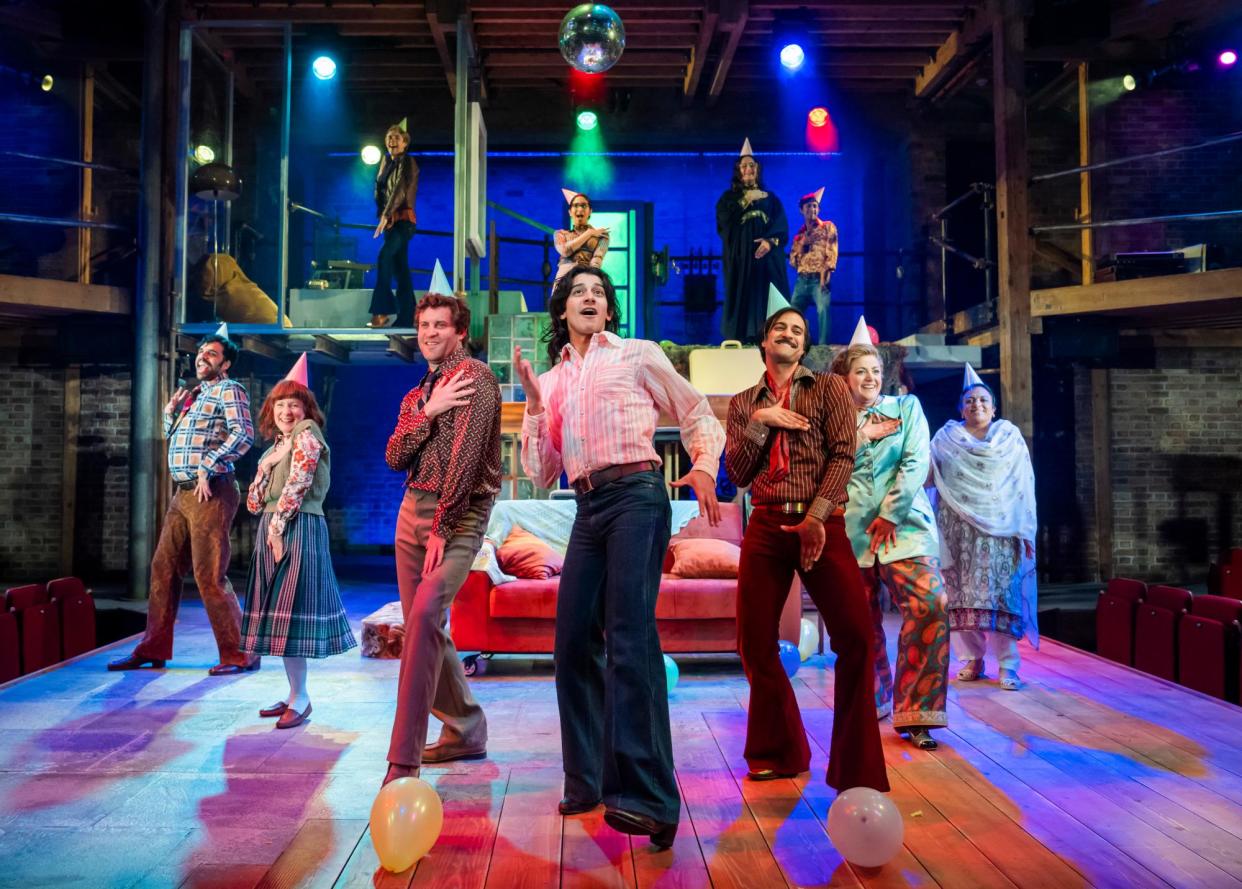The week in theatre: The Buddha of Suburbia; Love’s Labour’s Lost – review

So this is the new RSC. Vibrant. Daniel Evans and Tamara Harvey open their first season as joint artistic directors with a bold reimagining of one of the comedies and a carnival adaptation of a glorious 20th-century novel. They have filled the two stages with disguises and ideas about performing: with Shakespearean themes as well as with Shakespeare’s words.
Stratford now has more than one everyman: not only the prince of Denmark but The Buddha of Suburbia, or rather his son. The narrator of Hanif Kureishi’s 1990 novel is an ideal figure through whom to look inwards – at personality – as well as outwards, at an era and a society: vivid and in flux, he might have been created for the stage.
Karim Amir calls himself “an Englishman born and bred. Almost.” His schoolfellows call him Curryface (his father was born in Mumbai). He is a teenager surfing on possibilities: Bromley versus London, school versus the theatre, his mother, who wears a flowered apron, versus his father’s lover, who floats in a kaftan. He is avid and open, a sexplorer who thinks being asked to choose between girls and boys is as pointless as being required to choose between the Beatles and the Stones. This is 1979.
Present here is a vein that is easy to overlook amid the brio of the book – of an awakening not only to love but to pain and guilt
Emma Rice – it is good to see her being welcomed by the RSC, having been considered too wild a card to head the Globe – has adapted the novel with Kureishi. Myriad scenes are introduced by Dee Ahluwalia, who projects Amir’s beguiling, pliable semi-detachment, using a mic as if to say we are all the stars of our own acts.
Whirligig is delivered with broad-stroke vivacity. A surprising amount of Kureishi’s textured detail is captured in Vicki Mortimer’s costumes and Simon Baker’s sound design: turquoise velvet flares, Joni Mitchell, cuban heels, too-tight fawn trousers, roars of punk with lav-brush hair and stamping boots. As a theatre director who swings, Ewan Wardrop – all specs and furrowed experimentalism – delivers one of the best challenges to an audience member I’ve ever heard.
Excitement sags in the overextended middle of the evening, with the many strands of the novel fluttering on to the stage like confetti: the taunting, flaunting, minatory figure of a schoolboy idol, crucial in the novel, is simply a vestigial distraction here. What does not go missing is the daily, grinding racism: the sniggering name-calling, the beating up in the street, the demand that when cast as Mowgli, Karim should brown up and adopt an “authentic” accent. Also present is a vein that is easy to overlook amid the brio of the book – of an awakening not only to love but to pain and guilt.
In the novel, Kureishi talks in a forceful aside of the hearts of the Amirs breaking like pipes in the attic. Bettrys Jones, who doubles impressively as abandoned wife and a bewildering depressive posh actor, reveals this in an instant. As her ex-husband’s exuberant lover is being acclaimed, she turns her wiped-out face towards the audience. I have always thought of The Buddha of Suburbia with regret, having failed to persuade my fellow judges of the 1990 Booker prize that it should be on the shortlist. I mind that even more now.
Evans and Harvey did not take the obvious, as-audiences-are-most-certain-to-like-it option when programming their first Shakespeare. The very title of Love’s Labour’s Lost is a tease, posing the greengrocer difficulty of uncertain apostrophes. Its tale of men who swear to abandon the company of women – and then don’t – is often choked with the flamboyant wordplay it parodies. Yet under the direction of Emily Burns – apparently fresh from staging Dear Octopus at the National – the gamble has paid off.
Burns cannot make every line of this “alms basket of words” ultra clear: nearly every character wants to obfuscate with their patter. Yet her production tugs the audience over the “fire-new” verbiage. Luke Thompson, of Bridgerton, is particularly nimble as the most sceptical and dextrous of the word-spinners; Abiola Owokoniran effortless as King Ferdinand.
And Aloha! There is audacious, shrewd relocation of time and place. We are in Hawaii and the 21st century. Shakespeare’s threats of political instability are echoed in videoed news reports, while characters bask in a world anaesthetised by wealth, where Hawaiian flautists, drummers and guitarists soothe the brows of tech bros and sisters as they pad around spas or buggy over golf courses wrapped in their own keep-out jargon. Joanna Scotcher’s pale apricot design framed in a hoop of neon – very now yet looking something like a 1930s radio – perfectly transmits swaddled opulence and enables a terrific farcical episode when the set revolves with all the in-denial suitors hiding from one other, clinging to palm trees or stonework, like the damned descending to hell on a cathedral facade.
This early play (1594-5) has the interest of prefiguring other comedies. You can make out Malvolio in Tony Gardner’s fine, funny and eventually bitter pedant Holofernes, and see a version of the mechanicals in A Midsummer Night’s Dream, here wearingly overextending their inflatable pink-wigged fun. Yet there is also a breathtaking speech about love itself (soft as “the tender horns of cockled snails”), finely put across by Thompson. Oh, and some canny advice for its sophisticates. “We lose ourselves to keep our oaths,” goes the warning. Karim Amir would approve.
Star ratings (out of five)
The Buddha of Suburbia ★★★★
Love’s Labour’s Lost ★★★★


